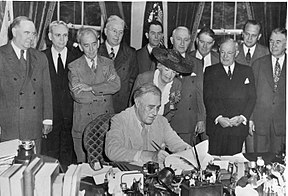GI Bill

The GI Bill of Rights , actually Servicemen's Readjustment Act , is a federal act of the United States from 1944 to facilitate the reintegration into working life for US soldiers (also known as GIs ) serving in World War II . After being passed in Congress , President Franklin D. Roosevelt signed it into force on June 22, 1944.
The law originally provided for the following benefits:
- some kind of unemployment benefit for a year after discharge from military service
- Discounted loans for starting your own business
- University access for every combatant.
The last point in particular was very controversial in the political discussion at the time. After it was implemented, the US began to develop into a mass university of today's character, with some universities tripling their student numbers from 1945 to 1948. The regulation also allowed war participants from those strata of the population to study who had previously had little access to university education, such as ethnic minorities . It thus had a profound influence on the American population structure, some of which are still visible today.
Between 1945 and 1949, over nine million World War I veterans received benefits under this law, including over four billion US dollars in unemployment assistance. Education grants were paid out to a total of approximately ten million people by 1956 and over $ 50 billion in loans by 1962. The law was later applied to veterans of the Korean War and extended to all soldiers in the United States Armed Forces , including those serving in peacetime, with the Readjustment Benefits Act in 1966 . The law was expanded further in the following decades.
literature
- Glenn C. Altschuler , Stanley Blumin: The GI Bill: A New Deal for Veterans. Oxford University Press, New York 2009.
- Edward Humes: Over Here: How the GI Bill Transformed the American Dream. Harcourt, New York 2006, ISBN 0-15-100710-1 .
- Jennifer Keane: Doughboys, the Great War and the Remaking of America. Johns Hopkins University Press, Baltimore 2001.
- Michael J. Bennett: When Dreams Came True: The GI Bill and the Making of Modern America. Brassey's, New York 1996.
- Milton Greenberg: The GI Bill: The Law That Changed America. Lickle Publishing, New York 1997.
- Suzanne Mettler: Soldiers to Citizens: The GI Bill and the Making of the Greatest Generation. Oxford University Press, New York 2005.
- Marcus Stanley: College Education and the Midcentury GI Bills. In: The Quarterly Journal of Economics. Vol. 118, 2003, No. 2, pp. 671-708.
Web links
- GI Bill of Rights , legal text. In: FDR Presidential Library (English).
- Eric Foner , John A. Garraty : GI Bill - World War II. Excerpt from The Reader's Companion to American History , 1991, in: History.com (English).
supporting documents
- ↑ Eric Foner, John A. Garraty: GI Bill - World War II. Excerpt from The Reader's Companion to American History , 1991, in: History.com (English).